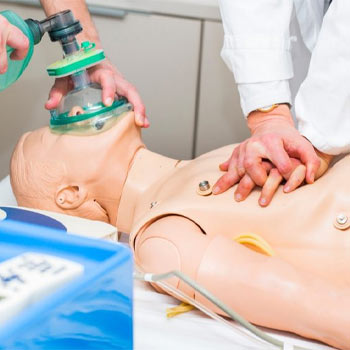Advanced Cardiac Life Support
- Home
- Services
- Critical Care Medicine
- Advanced Cardiac Life Support
What is Advanced Cardiac Life Support (ACLS)?
Advanced Cardiac Life Support (ACLS) is a set of clinical guidelines and protocols for the urgent treatment of cardiac arrest, stroke, and other life-threatening cardiovascular emergencies. These protocols are designed to improve the chances of survival and recovery through timely and effective interventions. ACLS is primarily used by healthcare professionals, including doctors, nurses, and paramedics, who are trained to perform advanced medical procedures in critical situations
What are the key components of ACLS?
Basic Life Support (BLS) Integration
ACLS builds upon the principles of Basic Life Support (BLS), which includes the following
- Chest Compressions: Effective chest compressions are vital for maintaining blood circulation during cardiac arrest
- Airway Management: Ensuring that the airway is open and clear to facilitate breathing
- Breathing Support: Providing rescue breaths to ensure oxygen reaches the lungs
Advanced Airway Management
In ACLS, advanced airway management techniques are employed, such as
- Endotracheal Intubation: Inserting a tube into the patient's trachea to maintain an open airway
- Supraglottic Airway Devices: Using devices like laryngeal masks to secure the airway
Electrocardiogram (ECG) Monitoring
ECG monitoring is essential in ACLS for diagnosing and managing arrhythmias (abnormal heart rhythms). Key aspects include
- Identifying Arrhythmias: Detecting life-threatening arrhythmias like ventricular fibrillation and ventricular tachycardia
- Administering Defibrillation: Delivering electrical shocks to restore normal heart rhythm in cases of cardiac arrest
Pharmacological Interventions
Medications play a critical role in ACLS. Common drugs used include
- Epinephrine: Administered to increase heart rate and improve blood flow to vital organs
- Amiodarone: Used for managing ventricular arrhythmias
- Atropine: Administered to treat bradycardia (slow heart rate)
Post-Cardiac Arrest Care
After successful resuscitation, comprehensive post-cardiac arrest care is crucial for improving outcomes. This includes
- Therapeutic Hypothermia: Cooling the patient's body to reduce neurological damage
- Hemodynamic Monitoring: Continuous monitoring of blood pressure and heart function
- Oxygenation and Ventilation: Ensuring adequate oxygen delivery and ventilation to prevent hypoxia (low oxygen levels)

Importance of ACLS
The importance of ACLS cannot be overstated, as it significantly improves the chances of survival and recovery for patients experiencing life-threatening cardiac emergencies. By equipping healthcare professionals with the skills and knowledge to respond effectively, ACLS saves lives and enhances the quality of care in critical situations
In summary, Advanced Cardiac Life Support (ACLS) is a comprehensive and systematic approach to managing cardiac emergencies. Through a combination of advanced medical interventions, effective teamwork, and continuous education, ACLS ensures that healthcare professionals are prepared to provide the highest standard of care during critical moments
